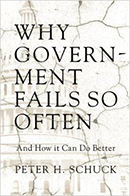If you’re in D.C., RSVP and register for Cato’s luncheon event on the publication of Damon Root’s Overruled: The Long War for Control of the U.S. Supreme Court. Description:
Featuring the author Damon Root, Senior Editor,
Reason magazine and Reason.com; with comments by Jeffrey Rosen, Professor of Law, George Washington University, and President & CEO, National Constitution Center; and Roger Pilon, Vice President for Legal Affairs, Cato Institute, and Director, Cato Center for Constitutional Studies; moderated by Walter Olson, Senior Fellow, Cato Institute.
What is the proper role of the Supreme Court under the Constitution? Should the Court be “active” or “restrained”? Or is that even the proper way to look at the question, however much we’ve heard it put that way for several decades now? In his new book, Damon Root traces this debate from the Constitution’s conception to the present. His central focus, however, is on the emergence of the modern libertarian approach, which cuts through the often sterile debate between liberals and conservatives and points to the Constitution itself by way of determining the proper role of the Court under it. Please join us for a refreshing account of this recent history.

